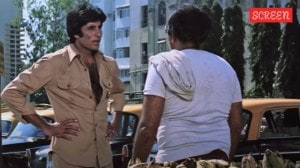Click here to follow Screen Digital on YouTube and stay updated with the latest from the world of cinema.
Bad Boy review: A grittier, more gruesome companion piece to Adolescence; Netflix’s teen drama is a brutal coming-of-age tale
Bad Boy review: From the creator of the original Euphoria and Homeland, the new Netflix drama is a grittier, grimier companion piece to Adolescence.
 Guy Manster plays a troubled teen in Bad Boy.
Guy Manster plays a troubled teen in Bad Boy. A comedian recounts the four traumatic years that he spent in a juvenile detention centre as a teen in the Israeli coming-of-age drama Bad Boy, now out on Netflix. The eight-episode series is interspersed with grainy footage of the comedian, who goes by Daniel, telling jokes about his troubled youth and life-threatening stint in juvie. He used to be called Dean Shaiman back then, and it’s a miracle that he survived. Co-created by Ron Leshem, who remains best-known for the original Euphoria, the series can best be described as the unholy lovechild of Adolescence and Seinfeld.
Like that landmark Netflix mini-series, which shattered viewership records only a few weeks ago, Bad Boy opens with a teenage boy being arrested by cops armed with a search warrant of his house. His bedroom is turned upside down, and within minutes, he’s shoved into the back seat of a police car before his mother can even get him his clothes. Like Jamie Miller from Adolescence, Dean is a deeply troubled kid. The difference is that Bad Boy lets us in on his psyche from minute one. The question, then, isn’t if he’s a problem child, but why he’s a problem child.
Also read – Adolescence review: Netflix goes god-tier with one of the greatest shows in modern TV history
 A still from Bad Boy.
A still from Bad Boy.
On his first day in the cooler, Dean witnesses a murder. He’s interrogated brutally by a couple of investigators about what he saw, but remembers the advice that he received from a security guard while coming in: never, ever rat on your fellow inmates. By keeping shut, Dean earns the respect of the big cheese at the facility, a maniacal teen named Freddy Sussan. He learns that Freddy doesn’t merely live in prison; he was born there as well, and will likely die in it. He is what the authorities would call an ‘offender’. They’re not the same as ‘criminals’. Criminals have a code; they don’t hurt the weak. Offenders will do anything to survive.
Across eight episodes, Dean will understand if he’s an offender or a criminal. He will also learn to navigate the dog-eat-dog world of reformation facilities, as he evolves into something of a legend in himself. Bad Boy unfolds in a non-linear fashion; the flash-forwards frame the narrative through an older Dean’s stand-up performance, while flashbacks open a window into his troubled life before incarceration. Dean’s mother, Tamara, ran away with him and his younger brother because she’d had enough of her abusive husband. He’d hit her when she was pregnant. Dean tried to locate him a few years later, but discovered that he was just as unpleasant as his mother had described him.
He got involved with local gangsters, and started pushing drugs in his school. He was arrested because his mother felt threatened by him. She isn’t able to forgive herself for having him sent to prison, but, over time, Dean discovers that he’s more comfortable on the inside than he ever was in the real world. He’s like a 13-year-old Brooks from The Shawshank Redemption. You remember Brooks; the elderly inmate who hangs himself because he can’t adjust to life as a free man? It’s like ferocious carnivores dying in captivity in zoos, because the easy life simply doesn’t suit them.
Dean develops a close friendship with a convicted murderer named Zorro, and grows to rely on a guard named Tully. He even develops a begrudging admiration for the prison’s warden, a woman named Chelli. She tells him that 96% of the kids that are sent to juvie end up returning. “You have to beat the statistics,” she says. He doesn’t, of course. And even though we know that he’ll become a famous comedian in the future, there’s always a smidgen of doubt. Dean is, after all, a rather unreliable narrator. And the show establishes him as such quite early on. Plus, the comedic interludes don’t exactly work. Humour relies on rhythm and delivery, which can often get lost in translation.
 A still from Bad Boy.
A still from Bad Boy.
Designed as an exercise in empathy, Bad Boy struggles to justify Dean’s actions. Not that it is supposed to; not everybody’s behaviour needs to be motivated. But because the show takes steps to delve into Dean’s past, you’d expect a little more depth. It’s like the grand reveal in Alia Bhatt’s Dear Zingadi. Watching Bad Boy flesh out Dean’s back story, you can’t help but wonder, “So that’s what was bothering you this whole time?”
There’s a reason why Netflix acquired and released Bad Boy now; they could’ve waited for the next season of Euphoria to come out next year, but knowing how Sam Levinson operates, there’s no telling if the HBO show will make it on time. And even if it did, the streamer would have had to jump through hoops to explain to the audience how Bad Boy is connected to it. It’s far simpler to sell it as something that audiences who liked Adolescence might enjoy. Don’t be surprised if the algorithm points you in its direction the second you finish that show. Leshem described Bad Boy as “the next Euphoria,” and while it deals with many of the same themes, its narrow point-of-view robs it of perspective.
Bad Boy
Creators – Ron Leshem, Hagar Ben Asher
Cast – Guy Manster, Neta Plotnik, Havtamo Farda, Daniel Chen, Liraz Chamami
Rating – 3.5/5


Photos
Photos
- 01
- 02
- 03
- 04
- 05






























